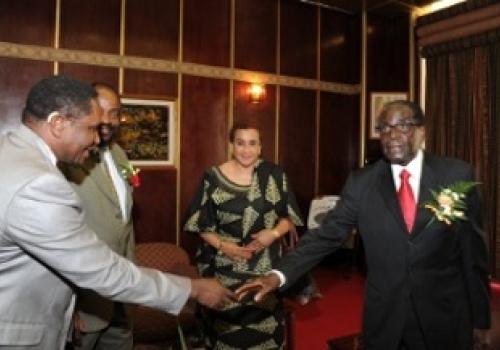MEDIA RELEASE
H.E Robert Mugabe, President of the Republic of Zimbabwe has reiterated the urgent need for harmonisation of COMESA and SADC emphasising that both Regional Economic Communities were established with an objective of enabling Member States attain economic development through regional integration initiatives and programmes. President Mugabe further underscored the importance of regional integration to economic development.
In this regard, the Republic of Zimbabwe and SADC have called for timely finalisation of negotiations on the COMESA-EAC-SADC Tripartite Free Trade Area and the establishment of the SADC Customs union.
During the courtesy call by SADC Executive Secretary, Dr. Stergomena Lawrence Tax on H.E Robert Mugabe, President of the Republic of Zimbabwe, in Harare, the two reiterated the importance of establishing a SADC customs union, as it would accelerate and deepen regional integration. "Substantial background work has been done, the main task now is to consolidate and refine technical work so far done in order to reach agreement and forge a common understanding on parameters, benchmarks, timelines, and implementation modalities of SADC customs union," they emphasised. Observing that membership overlaps exist among the SADC, COMESA and EAC, which presents technical challenges, they emphasised that the Tripartite Agreement should be used as a building block to address the multiple membership challenges. They further emphasised that both Tripartite Free Trade area and SADC Customs Union require commitment by Member States.
The Republic of Zimbabwe and SADC also reiterated the importance of African unity and economic independence in fostering continental development agenda. They also called for innovative ways of funding SADC regional programmes, and agreed that, there is an urgent need to re-examine the structure of the annual budgets of the SADC Secretariat. "The fact that more than half of the total budget come from International Cooperating Partners (ICPs) creates problems of ownership and sustainability".
While appreciating the support from the ICPs, the two leaders agreed that there is an urgent need to reduce dependence and embark on dynamic means that will enable the region to optimally develop and use its natural resources, while focusing on key priority areas to make impacts on SADC development and integration agenda. They urged for the implementation of the SADC Resource Mobilisation Strategy and a speedy finalisation and operationalization of the SADC regional Development Fund. In addition, they underscored the need to expeditiously finalise the review of the Regional Indicative Strategic Plan (RISDP).
Dr. Tax also paid courtesy calls on the Minister of Foreign Affairs, Honourable Simbarashe Mumbengegwi; Minister of Finance and Economic Development, Honourable Patrick Chinamasa; Minister of Agriculture, Mechanisation and Irrigation Development, Honourable Joseph Made; Minister of Tourism and Hospitality Industry, Honourable W. Mzembi; and Minister of Industry and Commerce, Honourable M. Bimha.
In discussions with all the Government Ministers, it was agreed that value addition and beneficiation of natural resources as well as infrastructure development are the cornerstones of regional development. They emphasised the need for commitment to the SADC Industrial Development Policy Framework, and the Regional Infrastructure Development Master Plan (RIDMP) which guides the implementation of coordinated and integrated infrastructure networks in six priority areas of energy, transport, tourism, information technology, meteorology and water.
While in Harare, the SADC Executive Secretary met SADC Ambassadors based in Harare, Zimbabwe, also visited the SADC Regional Peace Keeping Training Centre (RPTC), and the Southern African Research and Documentation Centre (SARDC). Dr. Stergomena Tax appreciated and underscored the importance of research in regional integration, and the SADC and the SARD agreed to enhance their cooperation through the existing MOU between the two institutions.

